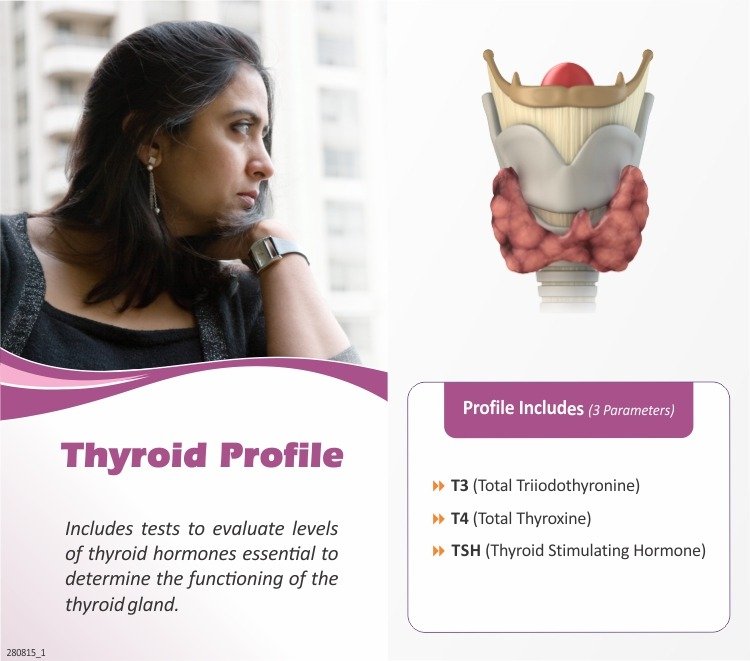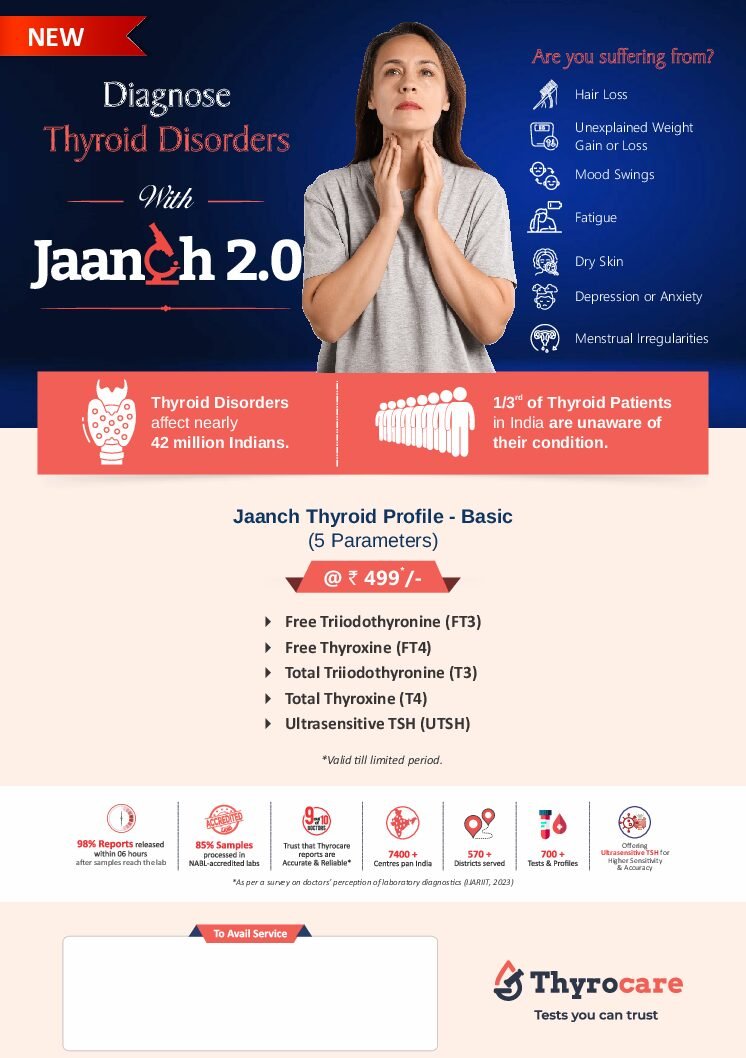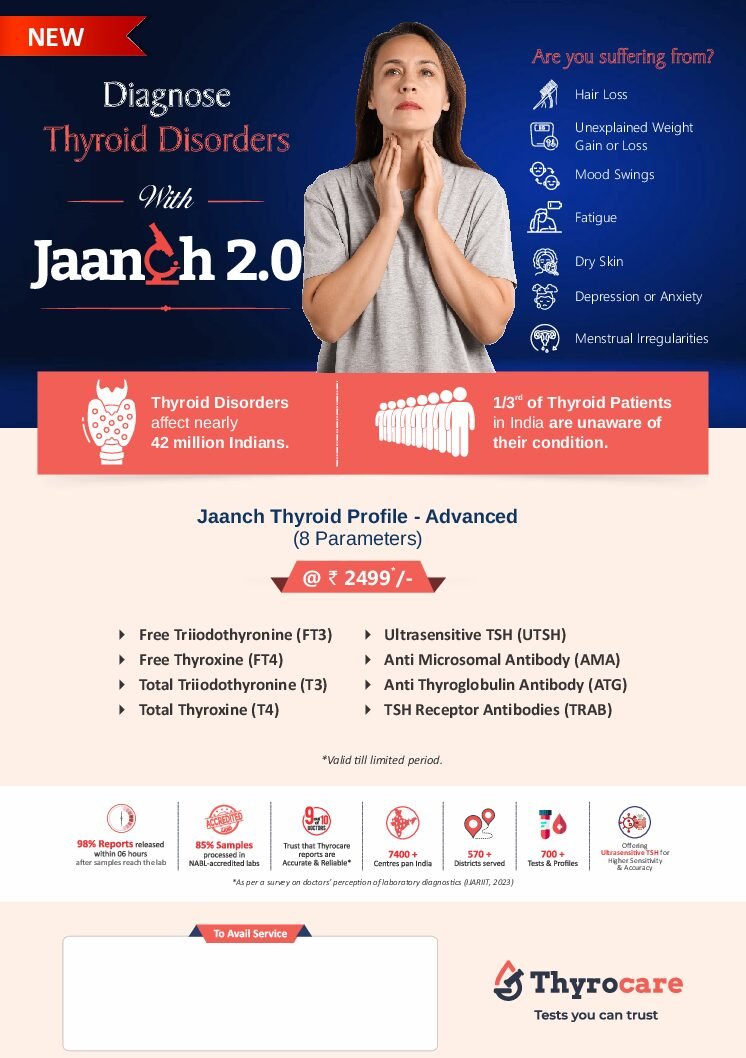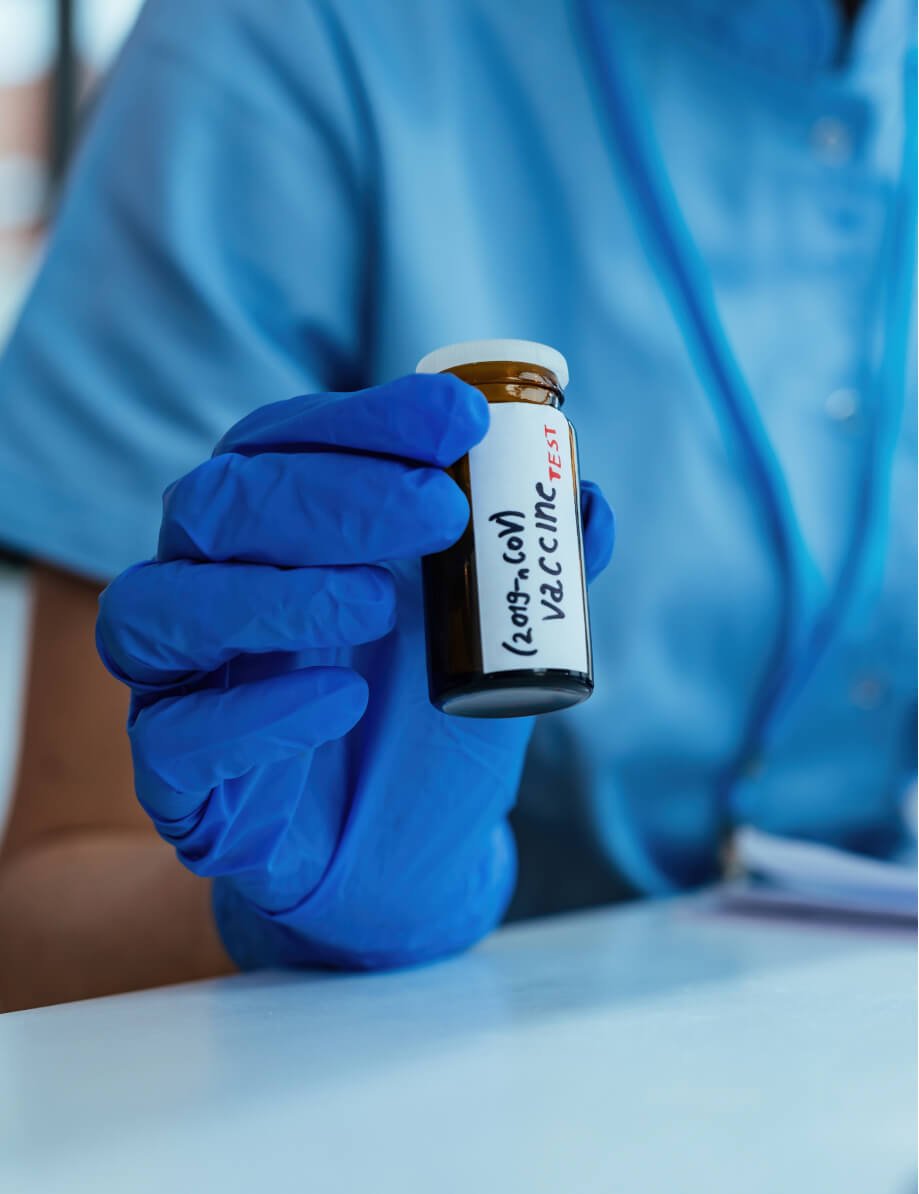- Thyrocare Aarogyam Centre
- April 10, 2024
- WOMEN'S HEALTH
- 0 Comments

Overview
What is THYROID PROFILE, TOTAL ?
Thyroid profile test includes thyroid hormones T3, T4 & TSH which helps to evaluate the functioning of thyroid gland in the body. This profile indicates whether thyroid gland is under-functioning or over-functioning or the function is normal. It also helps to monitor patients who are on treatment for thyroid disease. Persons at high risk of thyroid disease are newborns, those with a strong family history of thyroid disease, the elderly population, women 4 to 8 weeks after delivery, patients with autoimmune diseases and those on iodine deficient diet.
Why do you need the thyroid test?
- The thyroid is a small, butterfly-shaped gland located near the throat which mainly releases two hormones, T3 and T4, called triiodothyronine and thyroxine, respectively. These two hormones work together and are often referred to as thyroid hormones. Like all other hormones in the body, T3 and T4 also have their unique functions in the body. Being an important part of the endocrine system, they play an important role in weight regulation, maintaining energy levels and internal body temperature, and promoting skin, hair, and nail growth. Other than this, T3 and T4 also control the metabolism process in the body. Apart from these two, TSH is another important hormone that is released by the pituitary gland. TSH, or thyroid-stimulating hormone, as the name suggests, stimulates the thyroid gland to produce both T3 and T4.
When can the thyroid test be done?
A Closer Look
Triiodothyronine, or T3, is the active form of thyroid hormone, whereas T4 is the inactive form. A large part of T4 released by the thyroid gland gets converted into T3 by the liver and kidneys. As a result, approximately 80% of the T3 present in an individual’s bloodstream is a result of this conversion. Only the remaining 20% is produced by the thyroid gland. High or low levels of the T3 hormone may indicate an overactive or underactive thyroid.
Who needs to get tested?
It is important to maintain normal levels of T3, T4, and TSH. Otherwise, it can lead to a number of thyroid conditions and several other complications. To check these levels in an individual’s body, doctors usually suggest a T3 T4 TSH test. This is a panel test that checks the levels of all three hormones, T3, T4, and TSH, combined. However, sometimes the doctor suggests a T3 blood test separately as well. This lab test determines the average t3 levels in one’s body and is an important diagnostic tool for thyroid-related diseases.
What is the T3 Test?
Generally, the T3 hormone is present in two different forms in the human body:
- Bound T3, which attaches to protein
- Free T3, which is not attached to anything and moves freely
Depending on the type of T3 being measured, there are two different tests that are performed. When the test measures the levels of free T3, it is called a free T3 test. On the other hand, when both bound and free T3 are being measured, it is called a total T3 test. Either test can be used to check T3 levels, and if these levels are not within the normal range, this can indicate a thyroid condition.
Types of Thyroid-Related Conditions
There are a number of health conditions that can be caused when t3 and t4 levels are not within the normal range. Here are some of the most common thyroid disorders:
- Hyperthyroidism: This is a condition in which the body starts producing too much thyroid hormone (T3 and T4).
- Hypopituitarism: In this condition, the pituitary gland doesn’t produce normal amounts of pituitary hormones, including TSH.
- Hypothyroidism: This is a condition when the thyroid doesn’t produce sufficient amounts of thyroid hormones.
- Thyrotoxic Periodic Paralysis: This is a condition caused by excessive production of the thyroid hormone. When an individual has higher than normal levels of T3 and T4, it may result in muscle weakness.
Dedicated Professionals & Doctors Recommend Us
Dedicated professionals committed to providing you with accurate and reliable diagnostic services. Get patholab services today from the best lab experts & make a visit to our laboratory.
What is the Need for a T3 Blood Test?
A T3 blood test is most often used to diagnose hyperthyroidism. This is a condition caused by unusually high production of the T3 hormone. The doctor is likely to suggest this test when an individual experiences symptoms that can be associated with hyperthyroidism.
Here are a few common symptoms of this condition:
- Anxiety
- Unintentional weight loss
- Hand tremors
- Increased heart rate
- Bulging of the eyes
- Trouble sleeping
- Fatigue
- Low heat tolerance
- More frequent bowel movements
- Irregular menstrual cycle
Other than this, pregnant women are also advised to get thyroid testing done. Pregnancy is a time when thyroid levels in the body can fluctuate. However, these changes are temporary, and the levels go back to normal after childbirth.
Reverse T3 Test
Another common test that a doctor may suggest to diagnose thyroid-related complications is the T3 reverse test. Also known as Triiodothyronine Reverse, this blood test measures the levels of the reverse T3 hormone in an individual’s bloodstream. This is an inactive thyroid hormone that blocks the conversion of T4 to T3, leading to lower levels of T3 hormone in the body. High levels of reverse T3 are often associated with conditions related to low T3 levels. Although reverse T3 does not act like other thyroid hormones (T3 and T4), it plays a major role in brain development. Generally, this test is suggested when other thyroid tests like T3, T4, TSH, or the total/free T3 test show an expected result. In such a scenario, reverse T3 levels help in further diagnosis.
How to Prepare for the Test?
The T3 test is a simple blood test that does not require any specific preparation. Like other thyroid tests, T3 blood doesn’t require overnight fasting. However, certain medicines can alter the value of thyroid hormone and cause inaccurate test results. So, it is important to consult the doctor if an individual is on some kind of medication and take the necessary precautions.
Result Interpretation
When T3 levels are not within the normal range, this may be a sign of some thyroid-related problem. When these levels are high, they indicate a number of conditions, including:
- Graves’ disease
- Hyperthyroidism
- Painless (silent) thyroiditis
- Thyrotoxic periodic paralysis
- Toxic nodular goiter
In rare cases, high T3 levels may indicate thyroid cancer or thyrotoxicosis. Other than this, it can also be caused by high levels of protein in the bloodstream. On the other hand, when T3 levels are low, it may indicate hypothyroidism. Or, these levels can also be dropped because of a long-term illness.
Unlike several other health conditions, a thyroid disorder cannot be diagnosed by performing a single test. It may give an idea, but other additional tests are required to get any definitive answers about the problem. In such a condition, the doctor may suggest a T4 or TSH test to perform a proper diagnosis.
What is a Thyroid Profile Total test?
The thyroid is a small, butterfly-shaped gland at the base of the front of the neck and produces triiodothyronine (T3) and thyroxine (T4) hormones. These hormones affect all aspects of metabolism and also influence the control of vital functions, such as body temperature and heart rate.
TSH is produced by the anterior pituitary gland and stimulates the thyroid to release triiodothyronine (T3) and thyroxine (T4) hormones into the blood.
The Thyroid Profile Total test is a group of tests done together to diagnose thyroid disorders and disrupted thyroid function.
What does the Thyroid Profile Total test measure?
The Thyroid Profile Total test measures the level of following hormones in the blood
- Triiodothyronine (T3) – Total
- Thyroxine (T4) – Total
- Thyroid Stimulating Hormone (TSH)
The triiodothyronine (T3) and thyroxine (T4) hormones are present in the blood in two forms:
- Bound Form: The thyroid hormones are bound to proteins present in blood and this prevents them from entering the body tissues.
- Free Form: The thyroid hormones that are readily available for the body tissues.
The total triiodothyronine (T3) and thyroxine (T4) includes both bound and free forms present in the blood.
When is the Thyroid Profile Total test recommended?
The Thyroid Profile Total test is most commonly used
- As part of a routine health checkup
- Diagnose thyroid disorders such as hypothyroidism, hyperthyroidism, graves’ disease, or hashimoto’s disease
- Screen newborns for hypothyroidism
- Monitor treatment for thyroid disorders
- Diagnose the cause of infertility
How is the Thyroid Profile Total test performed?
A healthcare professional will draw a blood sample from a vein in the arm. No special preparation is required for the blood draw.
What are the risks of the Thyroid Profile Total test?
The Thyroid Profile Total test is a safe, standard test with very minimal risks involved such as
- Bleeding
- Light headedness
- Infection
- Bruising
What the results may indicate?
The Thyroid Profile Total test normal ranges may vary slightly among different laboratories.
The doctor will evaluate the results based on health, gender, age, and other factors.
High levels of thyroid hormones in the blood can cause symptoms such as weight loss, anxiety, muscle weakness, racing heart, or heat intolerance.
Low levels of thyroid hormones in the blood can cause symptoms such as weight gain, fatigue, enlarged thyroid gland, irregular menstrual periods, cold intolerance, or depression.
Google Reviews
 prashanthi duvvuri2023-12-13Quick service and excellent detailed reports provided.
prashanthi duvvuri2023-12-13Quick service and excellent detailed reports provided. Saikrishnan Ns2023-02-06Very interactive, responding well, and well executed. I would like to recommend to all my friends and relatives. Good job. Excellent. Continue to help
Saikrishnan Ns2023-02-06Very interactive, responding well, and well executed. I would like to recommend to all my friends and relatives. Good job. Excellent. Continue to help meena elango2023-02-03Prompt service
meena elango2023-02-03Prompt service Prakash K2023-01-08I was a big fan of Thyrocare services.. But my last experience was the worst of worst.. If you are giving the test on Sundays then you will not get your results on Sunday. They will promise to provide but they will loose your trust..Google rating score: 4.9 of 5, based on 24 reviews
Prakash K2023-01-08I was a big fan of Thyrocare services.. But my last experience was the worst of worst.. If you are giving the test on Sundays then you will not get your results on Sunday. They will promise to provide but they will loose your trust..Google rating score: 4.9 of 5, based on 24 reviews












